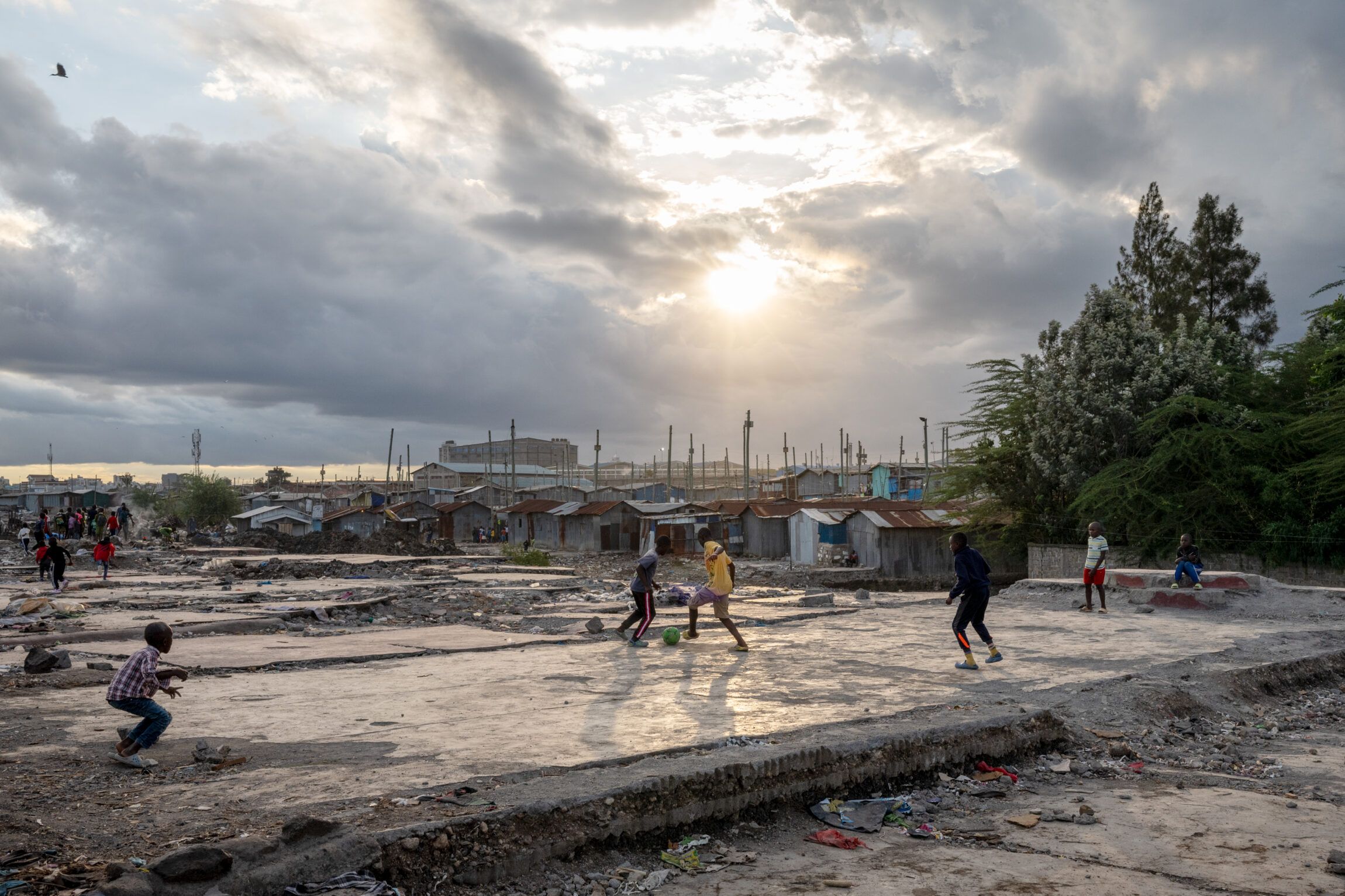Gaudensia Isalamba (41) is slowly moving back into her flood affected house. One of two rooms is still uninhabitable because of the April floods and repairs are needed before it can be used. So Gaudensia is using the other room – with the rest of her family.
“The floods affected us badly so now we have to stay in one room the 9 of us. There’s my husband and then we have a son in form four, one girl in form one, another girl in junior secondary grade eight, and twin girls. We also stay with my brother’s son who came to the city to look for a job,” she explains.
But – she adds – at least it’s better than sleeping on the roof top of a nearby building, which they all had to do for the first couple of nights until the rains stopped and the waters subsided. That was by order of the authorities.
Like many other residents in the informal, high-density neighborhood of Mukuru in the Kenyan capital Nairobi, Gaudensia’s life was turned upside down when torrential rains made the local river swell and join the open sewers-turned-streams until they had gained enough strength to enter or sweep away structures and houses in their path.

I have lived here for 16 years and never experienced anything like itGaudensia Isalamba
When it rains in Mukuru – it pours
‘It never rains but it pours’ goes the adage – and that is also the case in Mukuru. Because the ramifications of the floods also include loss of a business – and therefore an income – for Gaudensia and her family. This happened after the flooding when the authorities moved in to demolish structures too close to the river – for safety reasons. Gaudensia used to run a small retail business out of a wooden stall – and it was flattened in the process. Now the family relies solely on income from her husband who is a casual labourer. And the meagre income can barely cover the family’s basic needs.

“We pay 1,500 (11 USD) Kenya shillings for rent but we are struggling. And the house still gets flooded when it rains,” Gaudensia laments.
She says that she now keeps a large stone by their plastic chairs – she stacks the chairs at night and puts the stone on top before going to bed. That way she hopes to at least keep the chairs should Mukuru get flooded again.
And her fear of flooding is not unfounded. Because rain drops keep falling from the sky.
What is DCA doing?
DanChurchAid (DCA) Kenya is coordinating humanitarian efforts for people affected by the floods with the ACT Alliance Network. Mukuru is one of two priority areas for DCA.
DCA funding comes from Danida and in Mukuru it is delivered through Akiba Mashinani Trust – part of the Association of Kenyan slum dwellers – a long-term, trusted partner that works in Mukuru.
DCA Kenya’s country director – Karen Poore – says that the floods in April marked the beginning of what is predicted to be an unsually wet rainy season. And that the woes of those affected are not over:
“Since the heavy rains hit Kenya, hundreds of thousands of people have been negatively impacted; losing their homes, their income, and – in the worst cases – their lives. The rains are continuing, even as recovery efforts are underway, meaning the risks of further infrastructural damage and landslides are high,” said Karen Poore.

Through Akiba Mashinani Trust DCA hands out blankets and mattresses as well as water containers and purification tablets to Mukuru residents in need. Flooding increases the risk of cholera and other waterborne diseases.
But covering the immediate needs of the affected communities does not ensure that they will recover in the long term, warns Karen Poore.
“Those hit hardest will need more support going forwards to recover, and in the long-term community-led recovery and actions to mitigate against further damage should be prioritised. Whilst emergency response is critical, we also need to continue working together to support locally driven initiatives to build resilience and protect those suffering from the negative impacts of climate change coupled with inadequate infrastructure and continued deforestation in the future,” she explains.
As rains continue, the fear remains
For Gaudensia and her family, the future is uncertain. With nine family members in one room, the family income decimated, a heightened risk of contracting a waterborne disease whilst living in constant fear of the house being swept away by floods it’s hard to stay optimistic.
“What we hope for is that our house can be renovated to prevent future flooding. But if the authorities or an NGO offers us a house in a safer area, we are also happy to move,” says Gaudensia and adds that relevant authorities should work on fixing the drainage in Mukuru to minimise the risk of flooding in the future.
Heavy rainfall and floods
The first rainy season of 2024 (March-April-May) has been wetter than usual in most of Eastern Africa – and Kenya has been severely impacted. Heavy rains in March culminated in floods and landslides in April – and the rains continue in May.
80% of Kenya counties have been affected by the heavy rains – and by 16 May 2024 the overall consequences were:
- 291 killed
- 188 injured
- 75 missing
- App. 280,000 people displaced
- App. 410,000 people affected in other ways
With funding from Danida, DanChurchAid Kenya is coordinating relief efforts with its ACT Alliance partners in Kenya and focuses so far on two geographical areas:
- Mukuru (Nairobi): cash, blankets, mattresses, water containers, water purification tablets – delivered by Akiba Mashinani Trust
- Mai Mahiu (Central): Iron/zinc sheets for reconstructing home steads, domestic water containers, water purification tablets – delivered by Anglican Development Services



